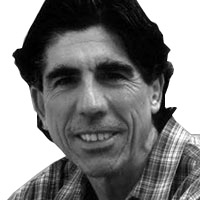The murder by a lone gunman of 11 members of the Tree of Life Synagogue in Pittsburgh calls to mind the horrifying bombing attack that occurred 55 years ago at the 16th Street Baptist Church in Birmingham, Alabama. Pittsburgh and Birmingham could not be more different in their history and commitments to diversity, but the lessons from that 1963 attack on an African-American church, which President John Kennedy did his best to help the country get through, apply to today.

Police tape is viewed around the area on October 28, 2018 outside the Tree of Life Synagogue after a shooting there left 11 people dead in the Squirrel Hill neighborhood of Pittsburgh on October 27, 2018. - A man suspected of bursting into a Pittsburgh synagogue during a baby-naming ceremony and gunning down 11 people has been charged with murder, in the deadliest anti-Semitic attack in recent US history. The suspect -- identified as a 46-year-old Robert Bowers -- reportedly yelled "All Jews must die" as he sprayed bullets into the Tree of Life synagogue during Sabbath services on Saturday before exchanging fire with police, in an attack that also wounded six people.
BRENDAN SMIALOWSKI/GettyIn September 1963, one month after the March on Washington, which seemed to mark a collective turning point in the civil rights movement, a bomb planted in the 16th Street Baptist Church killed four young African-American girls waiting for the 11 o’clock service to begin and injured 14 others. Three former Ku Klux Klansmen would eventually be convicted of the murders.
Birmingham was then a city known for its racial strife. Eugene “Bull” Connor, the city’s public safety commissioner, was infamous for using dogs and fire hoses to stop black demonstrators protesting segregation, and in the spring of 1963 the Reverend Martin Luther King Jr. wrote his famous “Letter from Birmingham Jail” after being arrested for taking part in civil rights protest.
Nonetheless, the church bombing sent off shock waves around the country, even in the white South. The deaths of the four girls, the oldest of whom were 14, was too much for even the harshest advocates of segregation to defend. The media played up the grim facts of the bombing. The church clock stopped at exactly 10:22 a.m., and the face of Jesus was knocked out of the only surviving stained-glass window.

A civil defense worker and firemen walk through debris from an expolsion which struck the 16th street Baptist Church, killing and injuring several people, in Birmingham, Ala. on Sept. 15, 1963. The open doorway at right is where at least four persons are believed to have died.
APPresident Kennedy did not treat the church bombing as the work of madmen so much as a reflection of those who through violence sought to maintain segregation in the South. Kennedy spoke of his hope that the tragic events in Birmingham would “awaken the entire nation to a realization of the folly of racial injustice and hatred,” but he was also willing to assess blame. In a statement that did not name but clearly referred to Alabama’s arch segregationist governor George Wallace, Kennedy declared, “It is regrettable that public disparagement of law and order has encouraged violence which has fallen on the innocent.”
Martin Luther King spoke at a funeral service for three of the murdered girls that was attended by more than 8,000 mourners and included white and black clergymen. But Kennedy understood more was needed from him than symbolic gestures or even his decision to send two representatives, former Secretary of the Army Kenneth Royall and former West Point football coach Earl Blaik, to help negotiate an integration plan for Birmingham.
As James Reston, The New York Times’s leading political columnist of the early ’60s wrote, the 16th Street Baptist Church bombing shattered all notions of public safety in Birmingham. “Even the white community no longer feels quite secure. The two Jewish temples in Birmingham are watched night and day,” Reston wrote, “and even the local newspapers, which have recently been critical of the extreme segregationists, are not safe from the night riders.”
In June 1963, in a nationally televised speech, Kennedy had proposed the legislation that eventually became the 1964 Civil Rights Act. He had defended his proposal by declaring, “It ought to be possible, in short, for every American to enjoy the privileges of being American without regard to his race or his color.”
At the heart of Kennedy’s speech was his declaration that in the midst of the racial crisis America faced, it was not morally possible to sit on the sidelines and remain a spectator. “Those who do nothing are inviting shame as well as violence,” Kennedy declared. “Those who act boldly are recognizing right as well as reality.”
In the wake of the Birmingham church bombings, Kennedy pushed to make his civil rights bill a reality. In October he helped get the House Judiciary Committee to approve a compromise civil rights measure by a 20-to-14 vote. Kennedy’s assassination in November 1963 would prevent him from doing more with his own legislation.
It is unclear whether today Kennedy would make a ban on assault weapons or immigration reform his top legislative priority, but certainly he would understand that speeches—welcome as they are—will not be enough to defuse the violence that currently permeates our public and private lives.
What Kennedy did not anticipate in 1963 was the violence that would take his and his brother’s lives as well as those of Martin Luther King and black and white participants in the Mississippi Freedom Summer of 1964 and the Selma Voting Rights March of 1965. On that subject and the need to be prepared for the long haul in dimming violence in America, we are better educated than Kennedy was.






